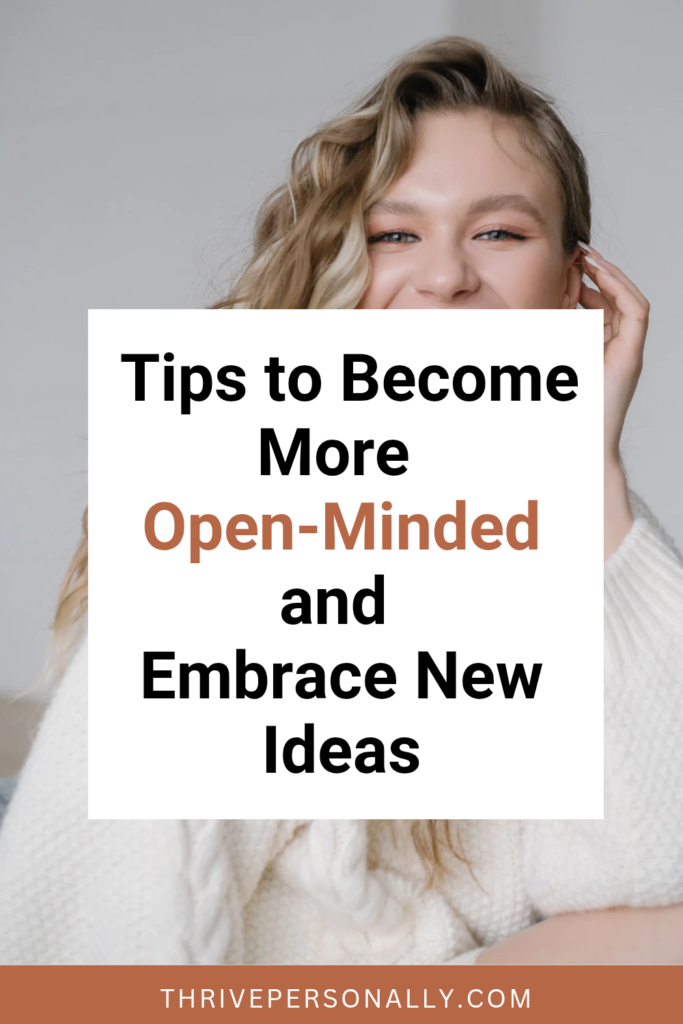Open-mindedness is about receiving new ideas and ways of thinking. It allows one to see things differently from how they initially perceived them. It is more than tolerating someone or something; it means allowing yourself to accept ideas that may contradict what you believe in.
If you allow yourself to be open-minded, you open a safe place for people to communicate with you. Below are tips to help you become open-minded, thereby allowing you to accept new ideas.
1. Acknowledge Your Biases
Accepting that we all have biases is the first step to becoming more open-minded and allowing new ideas to come your way. Biases come in different ways, such as stereotypes, negative comments about a particular group, preferences, or preconceived notions.
Our minds tend to pick up information without us realizing it. That is why biases affect our everyday lives, from the simple decisions that we make. Take time and look into what you believe in and see how limited you can be when accepting new ideas.
To start off, sit down and analyze how you feel about specific topics. Ask yourself why you feel a certain way. Maybe you strongly believe something is right or wrong when you’re not sure. You will find that you have formed an opinion with little knowledge or base your opinions on how you were raised and what you have seen.
Once you realize this, you’ll understand that your way isn’t the only way and there is always another side to everything.
Also, think about the different situations your biases play in. Are they political biases? Do they lean more towards cultural beliefs? Understanding how far your biases can go can help you become more open-minded.
Challenge your beliefs by speaking to people who think differently than you. Allow yourself to feel uncomfortable when you know you are wrong about something.
Read Also: 7 Toxic People You Need to Cut Out of Your Life Right Away
2. Listen Actively
Listening actively is a skill that you can apply to become more open-minded. When someone is talking to you, make sure you are listening to what they have to say. By simply doing this, you are allowing yourself to accept new ideas that you may have never thought about.
First, you should be making eye contact with the person who is speaking to you. This will not only show them that you’re listening but will encourage them to open up more. Also, provide them with a comfortable environment and a place with no distractions.
You will notice that when you focus on the person talking to you, you tend to take in more of what they are saying. You will learn to appreciate other people’s ways of thinking when you listen carefully.
Ask questions when a person is done speaking to clarify what they are saying. You are showing the person that you are interested in their story. You may learn something new when you word your questions correctly.
You don’t always have to agree with what they are saying. Your goal is to understand their point of view.
Read Also: 15 Quick Tips to Handle Embarrassing Moments
3. Get Out of Your Comfort Zone
Getting out of your comfort zone is key when learning how to have an open mind. You will never experience new ideas if you keep yourself closed off. Challenge yourself by trying new things. Try food from different cultures or do things you are afraid to do.
For example, you can meet new people who will open your mind to things you haven’t heard of. Visit your local town and see if they have any events going on that you can meet new people at.
When you learn about other cultures, you increase your knowledge on the different ways other people live.
You can do this by setting small goals for yourself. Try attending one event a month that will allow you to understand different points of view. You can also take a class that involves learning something you know nothing about.
These small steps will allow you to venture out and try new things, but they will also allow you to stay within your limits.
Read Also: 6 Reasons to Break Free from Your Comfort Zone
4. Seek Out Different Perspectives

One of the best ways to have an open mind is by seeking out different perspectives. Speak to as many people as you can that have a different way of thinking. Learning about other people will open your mind to ideas you haven’t thought of before.
You should surround yourself with people who will help broaden your mind. Attend local events that will allow you to meet a variety of people. You can even look for book clubs or workshops that deal with topics you’re not familiar with.
Use social media to your advantage. Follow different activists; there are so many voices out there that can teach you something new. You can learn so much from these posts that could help you grow as a person.
Don’t be afraid to ask questions when you’re reading something that you don’t understand. The comments can help you learn more and may even make you ask questions yourself.
When you are listening to someone, make sure you listen. Try not to think about what you are going to say next. Take in what the other person has to say. By understanding their way of thinking, you are allowing yourself to grow and can build a sense of community and trust with others who may think differently than you.
5. Accept Change
Accepting change is another way to keep your mind open. Change is something that happens to all of us. You can choose to let it control your life or allow it to help you. When something changes in your life, think of it as a clean slate.
Instead of trying to fight the change, embrace it and better yourself. Looking at change in a positive way will allow you to use the energy that it brings you. Don’t be afraid of change; use it as a tool to find new adventures.
Start by accepting that you are scared of change. We all are; that doesn’t mean you let it run your life. Think about why you are scared of change. Once you realize there can be a positive outcome, change will no longer scare you.
Surround yourself with things that will broaden your horizons. Speak to new people and read about topics you know nothing about. Exposing yourself to new information will allow you to keep an open mind about change.
6. Be Curious
Having an open mind also means you are curious. Ask yourself questions and find the answers. You can start by filling your space with people who think differently than you. When you’re around different people, you will have more meaningful conversations.
Asking questions is also a great way to keep your mind curious. The next time you’re listening to someone or observing a different culture, ask questions that make you think. Instead of accepting an answer that’s already been thought of, ask why.
Why do they think that’s the right thing to do? Or why do they feel that way? You will learn more by asking questions that make you think rather than yes or no questions.
Do your research. Challenge yourself to learn about something you know nothing about each day. You can pick up a book that involves a topic you would normally not read.
Set aside time each day to watch documentaries or read articles about things like science or different ways of life. Use your phone to your advantage and look up information on topics you’re feeling curious about.
7. Practice Empathy
Empathy is a great tool that will allow you to keep an open mind. When you empathize with someone, you allow yourself to feel what they’re feeling. Understanding how other people think will allow you to let new ideas and thoughts flourish.
The best way to empathize with someone is by listening. When someone is talking to you about something that they’re feeling, listen. Don’t think about what you’re going to say next. Pay attention to what they are saying and how they say it.
You may want to ask them questions to ensure you’re understanding them correctly. Empathizing with someone will not only help you understand them but can open your mind to ways of thinking you wouldn’t have thought of.
Try to feel your feelings as someone is talking to you. Think about why you feel that way and how your culture or where you come from has affected your thoughts.
Imagine how you would feel in that situation. Reward yourself when you understand how someone you don’t agree with politically or believe in may think.
8. Reflect on Your Experience
Learning something new is always fun, but take a minute to reflect on what you’ve learned. By reflecting on your experiences, you allow yourself to realize you are accepting new ideas.
Not only will this help you grow from the situations you’ve faced, but allow you to learn for the next time you need to keep an open mind. Reflecting can be done as often or as little as you want.
Once a week or once a month, pick a day and time that you will reflect on your experiences. You can use this time to clear your head and allow yourself to think.
Start by asking yourself questions. What new ideas have I learned? How has this experience changed my thought process? What was the most impactful thing I learned?
By asking yourself these questions, you will begin to understand how you think and felt during that experience.
Begin a journaling practice. Writing down your thoughts and experiences can help you remember what you’ve learned.
save the pin for later



